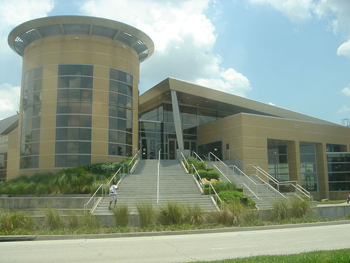Revamped Wellness Center Harvests Solar and Human Energy
 ORLANDO, Fla. — The University of Central Florida had a particularly green 2012, receiving LEED Gold certification in December for an expansion project on its Recreation and Wellness Center, in addition to installing a new photovoltaic system earlier in the year.
ORLANDO, Fla. — The University of Central Florida had a particularly green 2012, receiving LEED Gold certification in December for an expansion project on its Recreation and Wellness Center, in addition to installing a new photovoltaic system earlier in the year.
The Recreation and Wellness Center was expanded from an 85,000-square-foot facility to a 150,000-square-foot building in November 2010. Borrelli + Partners, an Orlando, Fla.-based architectural firm, designed the building, while WELBRO Building Corporation, out of Maitland, Fla., served as general contractor, and engineering firm TLC Engineering, also out of Orlando, administered the LEED process.
The $34 million expansion project added a new 25-meter by 25-meter pool, with a connected pump room, and expanded facilities for cardio work, racquet ball, offices, wet classrooms for poolside first aid classes and locker rooms, along with a multipurpose gym equipped for indoor soccer games. The project also included a master plan, calling for a grand total of 250,000 square feet of recreational programming spread throughout the campus in the long term.
The green focus goes beyond the building itself and includes its occupants, as 20 treadmills built by ReRev, a St. Petersburg, Fla., company, will actually convert the energy generated from students running on them into energy that will go back into the facility. A 30-minute workout can produce the amount of energy needed to fully charge six cell phones or keep a laptop running for an hour.
More traditional green features include occupancy sensors and a lighting system that adjusts to daylighting conditions. A highly efficient reflective roof, stormwater management, low flow fixtures and efficient landscaping were also highlights of the green building strategy.
“We are so proud and pleased to receive this certification,” James Wilkening, director for the RWC, told UCF Today, the student newspaper and website. “The RWC takes great pride in not only being good partners within the UCF community but within the global society, as well as shares a glimpse of that commitment.”
The school added 448 solar panels to the adjacent parking structure, Garage B, in winter of 2011, with the installation going fully online in the spring of 2012. The solar system has already provided 35,000 kilowatt-hours of energy used to light the garage. The set of arrays are projected to generate about 157,000 kilowatts per year, enough to power over 130 houses. This means they generate over half the power used by the parking structure, saving the university more than $15,000 per year.
The panels were provided free of charge by Progress Energy, a utility company that recently became a part of Duke Energy, the largest regulated utility in the nation, with 7 million customers in six states. They were installed as part of the company’s SunSense Schools program, which gave solar systems to schools that demonstrated a dedication to teaching students about renewable energy.
The company and university had already worked together, adding an 11.2-kilowatt solar system to the Engineering I building in 2009. The green efforts all fit into the school’s plans to be carbon neutral by 2050.
